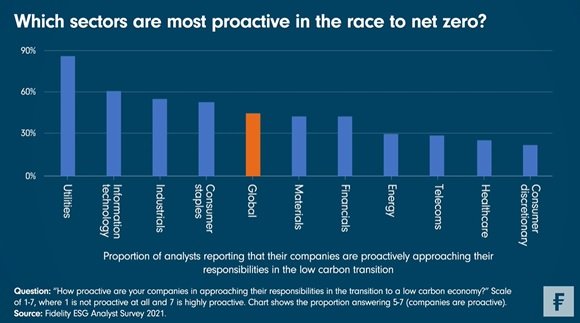Fidelity: Which sectors are most proactive in the race to net zero?
Fidelity: Which sectors are most proactive in the race to net zero?

The transition to a low carbon economy is gathering pace, with no company immune to the global push to reach net zero emissions by 2050. Our first Analyst Survey focussed solely on sustainability reveals that just under half of Fidelity International analysts say companies are proactively approaching their responsibilities to the low carbon transition, with significant variation across sectors.

An existential question
Utilities lead the way, with almost 90 per cent of analysts reporting that the companies they cover are proactive. The transition offers clear business opportunities for utilities, with one analyst covering Europe saying that companies are “highly incentivised” to build renewable generation capacity and use renewable electricity for their own consumption.
The analyst adds: “The economics of renewable assets are now better than thermal, and regulation and investors are all very ESG-centric. Therefore, utilities have been very active in transitioning to a low carbon economy.”
More than half of industrials analysts also report that their companies are proactive. One analyst covering European autos argues that the transition is “an existential question” for auto original equipment manufacturers (OEMs). “Nearly all OEMs have well thought-out investment programmes and product roadmaps to fully electrify their offering. There are some exceptions, but, on the whole, the industry is now extremely proactive.”
Regulatory and investor pressure can help companies decarbonise more quickly
Not all companies are on the front foot when it comes to decarbonising. Just 20 per cent of our consumer discretionary analysts believe companies in their sector are approaching the transition proactively. “They are willing to do their part, but are not driving the change,” reports one analyst covering North American gaming, leisure, and consumer products.
The survey suggests that other companies are only doing the bare minimum and are not yet willing to go the extra mile. “US chemical companies are aware of the need to reduce carbon emissions, but I don’t think they are yet ready to spend to decarbonise faster than necessary”, reports one materials analyst covering North America.
However, external pressure from regulators, investors, and consumers is increasingly pushing even those industries that need to make substantial capital commitments or completely change their business models to take their first major steps in the transition.
“My companies all generally want to fulfil their responsibilities in the transition to a low carbon economy”, says one analyst covering European metals and mining firms. “However, they're usually less willing when it might require higher capex or opex. In these situations, they often need a push from the investor community, which can highlight that better ESG practices at the expense of slightly worse near-term financials is sometimes beneficial.”
In the long run, all companies will need to adapt to a net zero economy. It is the businesses proactively grasping this new reality that will be best placed to capitalise on the opportunities generated by the low carbon transition. Those that do not could soon be left behind.










